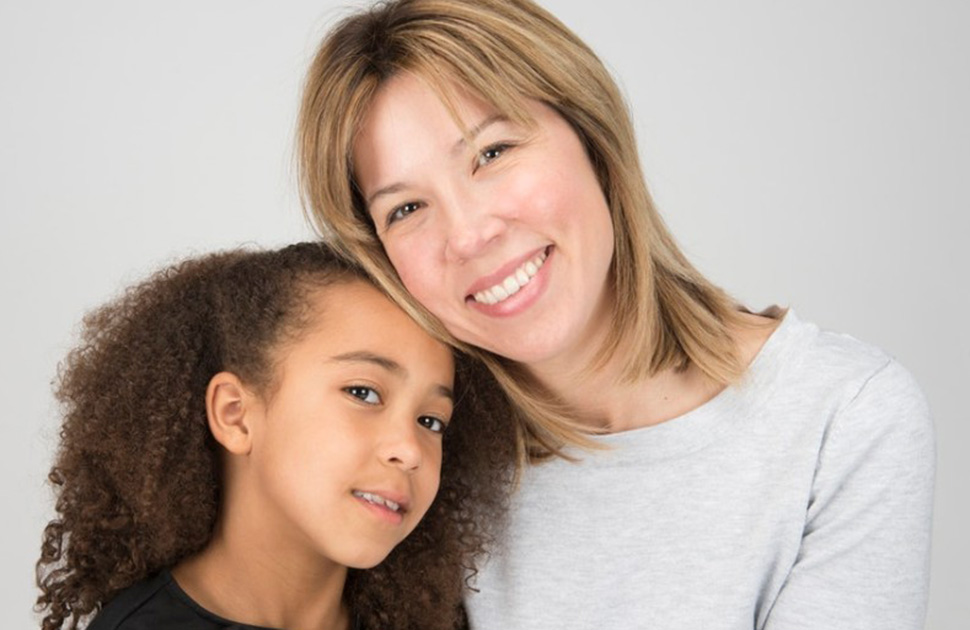
Integrated Educational Approach
|
Learn more about our Integrated Educational Approach |
|
Each student at CHEO School benefits from tailored programming aligned with their IEP, delivered by our dedicated team of teachers and educational assistants. Instruction focuses on high-quality literacy, numeracy, and early learning strategies within the framework of the Ontario Kindergarten Curriculum. Class sizes are kept small, six to seven students to meet the specific needs of students. Classroom Multi-Disciplinary Teams convene monthly to evaluate student progress. The observations and notes from these meetings are recorded and serve as vital assessment data for student progress reports. |
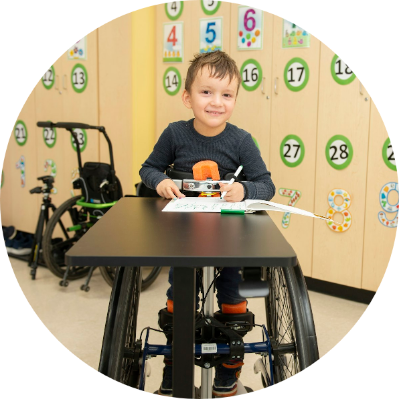
Assistive technology
|
Learn more about how we use assistive technology |
|
At CHEO School, we understand the critical role of technology in enhancing educational experiences for all students. Our comprehensive technology strategy ensures access to the latest tools, supporting learning and creativity. Our facilities feature state-of-the-art resources such as interactive whiteboards, iPads, laptops, Chromebooks, communication devices, adapted keyboards, joysticks, and switches. Each technology is carefully selected to maximize student engagement and learning potential. Our Digital Learning Teacher collaborates closely with our team of educators and therapists to seamlessly integrate technology into teaching practices. Continuous professional development keeps our staff updated on educational and assistive technology trends. Through strategic technology investments and a commitment to improvement, CHEO School equips students with the tools and support to effectively access the curriculum and demonstrate their learning. This proactive approach prepares students for success in mainstream schools and beyond. |
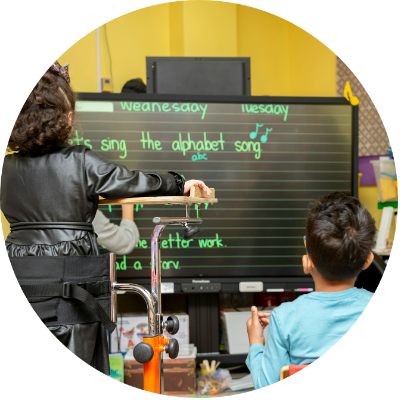
Outdoor Education
|
Learn more about outdoor education at CHEO School |
|
Outdoor Learning is an integral part of the kindergarten curriculum at CHEO school. We have an Outdoor Classroom that has been thoughtfully and purposefully created to foster inquiry and learning. The students learn a variety of concepts and skills that connect them to the earth. When we learn outdoors, we honour Indigenous knowledge and ways of knowing, along with teaching the importance of ecological practices. As part of the Kindergarten Physical Education and Health program, students spend time learning in the Outdoor Classroom, as well as in various outdoor spaces. Students learn in the Outdoor Classroom for a minimum of 40 minutes daily throughout the school year. Students are expected to dress for all types of weather conditions to facilitate comfortable outdoor learning experiences from September to June. |
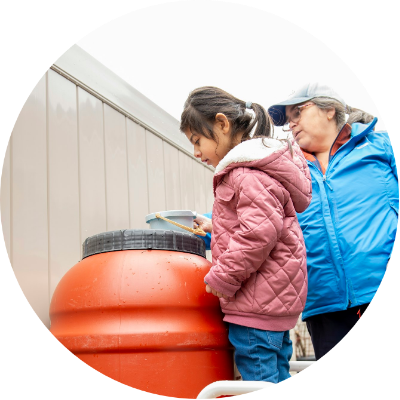
Music Therapy
|
Learn more about Music Therapy at CHEO School |
|
An accredited music therapist provides an engaging, interactive and therapeutic music program for the students at CHEO School. This adaptive music education approach supports each child's individualized goals through music games, sensory experiences, singing, and instrument playing. Music is an activity which motivates children and in which they can feel successful - those aspects make music sessions an ideal setting in which to practice the skills in their individual education plans. Apart from the benefits in these other domains, playing and listening to music has proven beneficial for brain development more generally. Plus, the kids love it! |
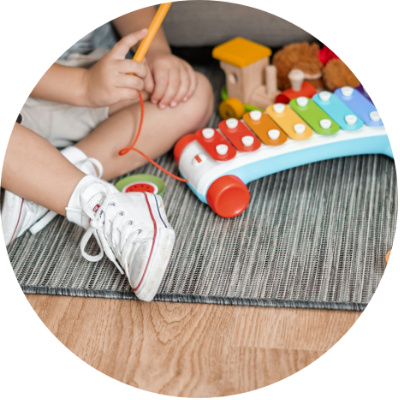
Specialized communication tools
|
Learn more about specialized communication tools |
|
In our classrooms, we employ a variety of communication systems, from low-tech PECs to advanced voice output systems, empowering students to communicate effectively. These tools are developed in collaboration with the Clinic for Augmentative Communication and student Speech and Language therapists. Referrals for these interventions are managed by our Multi-Disciplinary Team in consultation with the school Principal. |
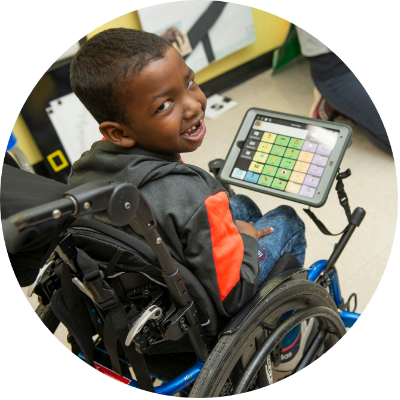
Therapy services for students enrolled in CHEO School
CHEO School Authority is a specialized educational program, serving students with complex needs by providing an Integrated education and therapy program. All students admitted to CHEO School are also clients of the CTC and have a primary diagnosis of a physical disability and other associated complex needs. Our students require a multidisciplinary classroom team to develop strategies, promote independence, and utilize adaptive equipment to access curriculum and prepare for transition to a public education setting in grade 1. Students demonstrate rehabilitation needs in two or more of the following therapy areas:
- Physiotherapy
- Occupational Therapy
- Speech and Language Pathology
The therapy teams assess the students' therapeutic needs to determine which therapy services will contribute to a child’s skill development. Therapy services that may be provided to CHEO School students include Speech-Language Pathologists (S-LP), Physiotherapists (PT) and Occupational Therapists (OT). Communicative Disorder Assistants (CDA) and Rehabilitation Assistants (RA) also provide support to CHEO School. Therapy is different for each student and may change in frequency throughout the school year. The therapists may also prescribe equipment for use at school and/or home.
During the school day, children may receive physical, occupational and/or speech therapies along with educational programming based on the Ontario Kindergarten Program. The therapy is provided by professional therapists working in a team setting with special education teachers and educational assistants. The teachers, therapists and support staff collaborate to establish individual learning and therapy goals and share the responsibility of programming for the goals of each student.

School Liaison for CHEO School Authority
Services are offered by our School Liaisons, who are Special Education Teachers supervised by the CHEO School Authority Principal. School Liaison staff connect and share information between families, school board staff, and CTC/CHEO service providers to optimize your child’s school experience.
This service includes consultation during key transition times for students, like entering school, switching school boards or moving to secondary or post-secondary education.
Eligibility criteria
To be eligible for school liaison services, the child or youth must be a current client of CTC with their primary need being support for a physical exceptionality. Services may extend from the year before their transition to primary school in their community, up to grade 12.
What to expect from School Liaison Services
School Liaisons are Special Education Teachers supervised by the CHEO School Authority Principal.
What to expect from School Liaison Services
School Liaisons provide either direct or indirect service models to eligible students:
- School Liaisons provide direct service to the CHEO School Kindergarten program. School Liaisons actively support CHEO School student transitions to the school board selected by the family upon exit from the program. The service shifts to indirect/consultative service for former CHEO School students up to grade 12.
- School Liaisons provide indirect/consultative service to other eligible students, families, CTC/CHEO staff and school board staff when students enter and/or attend one of the nine publicly funded school boards across Eastern Ontario. Indirect service may include consultation during key transition times for students, like entering school, switching school boards or moving to secondary or post-secondary education.
Eligibility criteria
To be eligible for school liaison services, the child or youth must be a current client of CTC. Eligible students' primary need is support for accommodations of a physical exceptionality. Services may extend from the year before their transition to primary school in their community, up to grade 12.
Please note:
- School Liaisons do not determine services or school placements for students. Special education service delivery model decisions are determined by the school board.
- Parents/Guardians are responsible for selecting and registering at their preferred community school.
- School Liaisons cannot offer behavioural services or educational advocacy.
- Please refer to the CHEO Access Team for other services and supports.
Make a referral
Referrals for the School Liaison service can be made through CHEO Access Team, and will be directed to the principal of CHEO School.
CHEO School staff, including School Liaisons follow a 10-month school calendar. Referrals are not checked during July and August.
More about CHEO School
